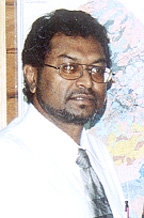The growing scrutiny from Western democracies and financial institutions of the Jagdeo administration may be responsible for its recent tendency to look to the Middle East for aid and investment, says the Alliance For Change (AFC).
AFC Chairman Khemraj Ramjattan made this argument last month, during a meeting with Matthew Canzer, the political advisor of the US Mission at the United Nations. According to an outline of the presentation made, Ramjattan suggested that “the scrutiny and subtle persuasions that he [Jagdeo] may be getting for some time now and more recently from the Western democracies and institutions like the World Bank… may have consolidated the shift” in turning to the Mideast. He pointed to the recent tiff between Finance Minister Dr Ashni Singh and World Bank Country Repre-sentative Georgio Valentini over the disbursement of money from Norway and to the critical statements of Human Services Minister Priya Manickchand against the US State Department after the release of the Trafficking In Persons (TIP) report.
Ramjattan said the government’s decision to allow Iran to do mapping of Guyana’s mineral resources, more particularly uranium resources, “is a dangerous development”.

He said it was also “unsettling” that the administration had turned down $1.6 billion in assistance from Britain to reform the security sector and that it did not facilitate the establishment of a Drug Enforcement Administration (DEA) office in the country. Ramjattan pointed to the importance of such an office in Guyana which is known as a transshipment point for narcotics and when there are “notorious relations within government circles with well-known and now convicted narco-dealers.”
When contacted yesterday, Ramjattan said his party was concerned about the government’s new trend of looking to the Mideast. “We’re very concerned about that shift,” the party chairman said. According to him, it was clear that the government wanted to ally itself with these “undemocratic nations” which did not place much emphasis on transparency, accountability and good governance.
While acknowledging that a sovereign state is free to choose its friends, Ramjattan said that as an opposition member he is free to criticize these choices, especially if they were not in the best interest of the country. “It is just like the PNC days,” he said, noting that after the US government began to put pressure on the Burnham administration he then sought help from Cuba, Russia and other states that were more pliant.
Ramjattan said that he favoured close relationships with the superpowers in the West, since they were more transparent and were more committed to the principles of good governance. He said that as “small fry” in the political landscape, Guyana needed to learn how to survive “with these bigger fishes. This is the political reality.” He emphasized that Guyana still would have the right to speak out against these larger nations. “They [these bigger nations] won’t just come and tumble up your country,” he said since these nations operated in a different way from the past.
Meanwhile, Ramjattan explained that he led the AFC team in the meetings since they coincided with a personal visit he was making to the USA at the time. He said that the party’s leadership knew who he was meeting and the general thrusts of his presentation. However, there would have been ignorance in a few areas, since some of the responses he would have given would have come from questions that the officials would have answered.
Ramjattan, however, stated that as the AFC’s likely presidential candidate for next year’s elections, the exposure would have done him well. He, however, said that his representation there had nothing really to do with him being the party’s chairman or likely presidential candidate.
During the meeting with Canzer, the continued absence of local government elections was highlighted. It was argued that this is because the regime does not want “to allow decentralization and devolution of powers away from the central/ministerial government.” He also pointed to the “continued abuse of state resources for campaign purposes which are going on right now all across the country.”
Stabroek News understands that the party handed over several documents to Canzer. A document stating why the AFC believes that Guyana could enter the abyss of a failed state category along with a partial corruption dossier was also handed over. A copy of the Hansard with the parliamentary debate surrounding the controversial $4 billion transferred to the Housing Ministry without proper parliamentary consent was handed over and a document prepared by Gerhard Ramsaroop: “Report on Guyana Government Blogging as paid by taxpayers’ monies”.





